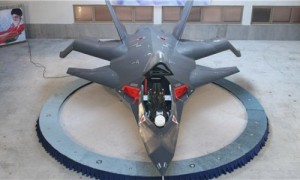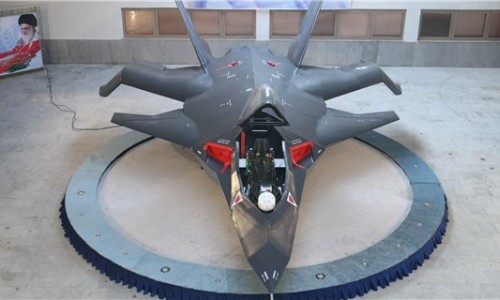
TEHRAN � Iran has trumpeted military, space and nuclear advances in a series of announcements coinciding with a new bid by world powers to revive stalled talks with Tehran over its atomic ambitions.
In an unveiling ceremony inside a hangar on Saturday, President Mahmoud Ahmadinejad unveiled a futuristic-looking fighter jet he said ranks among the most sophisticated aircraft in the world, media reports said.
Code-named the Qaher (Conqueror) F-313 and shaped similar to stealth bombers, the grey warplane was designed and built domestically, Ahmadinejad told an audience of defence ministry top brass.
It "is among the most advanced fighter jets in the world," he said while insisting the F-313 was "a deterrent" meant to send a "message of peace" -- despite its aggressive name.
Defence Minister Ahmad Vahidi was quoted in media as saying the plane boasted a very low radar signature, and that "advanced materials" were used to build it.
The unveiling comes as Iran marks the 34th anniversary of the 1979 revolution, which replaced the US-backed shah with an Islamic regime.
It traditionally uses the anniversary period to showcase military, space and nuclear advances, against a backdrop of international sanctions.
Tehran is locked in a showdown with the UN Security Council over its disputed nuclear activities, including sensitive uranium enrichment which the West suspects is part of a military programme, despite Iranian denials.
The resumption of talks between Iran and world powers aimed at resolving international concerns over its activities have stalled for months.
Iranian pronouncements of achievements have increased in recent years, as Tehran desperately aims to prove the West's embargo on its military, technology and economy have failed to dent its determination.
On January 28, Iran said it sent a monkey into space to an altitude of 120 kilometres (75 miles) for a sub-orbital flight, challenging Security Council sanctions against the development of its ballistic programme.
But Iran considers its space programme as strategic and non-negotiable, echoing its stance on its nuclear activities.
The US cautiously reacted to the news, saying it could confirm it. But it said that if true, the launch violated UN resolutions.
On January 23, Iran had informed the UN's International Atomic Energy Agency of intentions to install more modern enrichment equipment at Natanz, one of its main nuclear sites.
Western powers condemned the move, with Washington describing it as a "provocation" in Iran's continuing violations of its obligations.
Israel, the sole but undeclared nuclear state in the Middle East which refuses to rule out a military strike against Iran, warned the advanced machines would edge Tehran closer to nuclear arms.
The developments come as the so-called P5+1 group of the United States, Britain, China, France, Russia plus Germany are painfully trying to revive the nuclear talks with Iran and prevent a military solution, threatened by the US and Israel.
The last round of such talks held June in Moscow ended with a stalemate, as did previous rounds.
A new round is in the offing, possibly in February, but the sides have failed to agree on date and venue, blaming each other.
To further its defiance, Tehran announced this week it would launch "in the coming days" a new observation satellite, while two new space projects are expected to be announced Saturday.
By AFP
The Iran Project is not responsible for the content of quoted articles.











